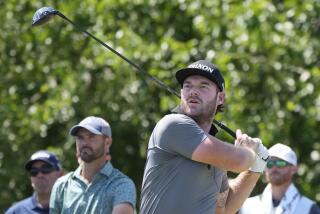For Him, Seeing Is Believing a Third Victory Is Possible
- Share via
They call him the Doc, even though he never has been in practice. If Gil Morgan wanted, he could practice optometry in either Florida or Oklahoma, where he is licensed.
But instead, the Doc plays golf.
In fact, some of the players on the tour frequently seek his advice.
“They ask me about contact lenses or solutions, or ask if they are doing this or that right,” Morgan says.
But Saturday, at Riviera Country Club, he was only known as Gil Morgan the golfer, who is tied with Rocco Mediate for second place in the L.A. Open. After three rounds, Morgan’s score is 14 under par, two strokes behind leader Fred Couples.
Morgan hasn’t had a bogey in the 54 holes.
“I kept thinking it’s going to catch me, but it didn’t happen,” Morgan said after he shot a 65 in the third round. “I don’t think I have ever played a tournament without a bogey, unless it was a nine-hole tournament.”
Morgan, 43, chose to complete eight years of school before turning professional. He earned his undergraduate degree at East Central State College and then applied to Southern College of Optometry in Memphis.
“I pursued school because there was Vietnam for one thing, and also graduates were coming out of school and obtaining better jobs,” Morgan said. “I actually was thinking about being a dentist, but a friend suggested optometry.”
It was in optometry school that Morgan discovered he was far-sighted.
“I didn’t even know I had a problem until I had my first eye exam in optometry school,” Morgan said. “I would strain to read, but I didn’t realize it was a vision problem.”
Will he ever practice optometry?
“If I start practicing, then that means I’m through with golf, and I’m not there yet,” he said. “I have several more years on this tour and then a few on the Senior Tour.
“I’ll be giving portable exams at the rest home.”
Morgan has won the L.A. Open twice. In 1978, Morgan’s sixth year on the tour, Jack Nicklaus bogeyed the 15th hole on the final day, and Morgan held on to win by two strokes.
In 1983, Morgan emerged in the third round and shot a 68 in the final round at Rancho Park for another two-stroke victory.
“I have good memories here, it suits my game,” Morgan said. “I’m a better ball-striker than a putter, and that works on this course.
“I remember the shots I’ve made and the reaction from them, and I think that’s helpful. As long as the golf course doesn’t change any.”
Morgan began the day at eight-under, three strokes off the lead. He hit a two-iron to the fringe of the first hole, then two-putted for a birdie to put him at nine under. He made par on the next six holes, then sank a 10-foot putt on No. 8 to put him at 10 under.
On the backside, he birdied Nos. 10, 12, 13 and 17 to finish at 14 under.
“I’m playing about as well as ever,” Morgan said. “My game’s in good shape. I’m hitting well from tee to green.”
The past few years, however, have been an uphill battle for Morgan. After finishing fifth and 13th on the money list in 1983-84, respectively, he started having shoulder problems.
In 1985, he fell to 62nd on the money list. Then, in 1986, he underwent rotator cuff surgery on his left shoulder at Centinela Hospital Medical Center.
He got off to a fast start on the tour in 1987, but was playing so much that it caused more stress to the shoulder. He slowed down a little, and finished the year 81st on the money list.
In 1988, however, he finished in the top eight in seven consecutive events to climb to 34th. Last year, he had six top 10 finishes to close out the year 39th.
Still, the wear and tear on Morgan’s shoulder has produced other physical problems, primarily in his neck and right shoulder. That precludes Morgan from practicing golf as much as he would like.
“I ice my neck every night,” Morgan said. “And I haven’t hit at the driving range after a round like the other guys.”
And although he says being a veteran has its advantages, Morgan says that being a past winner also has its downside.
“I think the longer you’re here, you know what it takes to win, and how hard it is,” he said. “Sometimes that’s good, sometimes you go ahead and do it. As you get older, the next win is always the hardest at a certain point in time, at least in my case.”
After seven years, Morgan hopes that next victory comes today.
More to Read
Go beyond the scoreboard
Get the latest on L.A.'s teams in the daily Sports Report newsletter.
You may occasionally receive promotional content from the Los Angeles Times.










